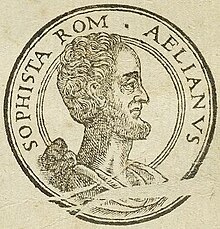
Back كلوديوس إيليانوس Arabic كلوديوس اليانوس ARZ Клавдий Елиан Bulgarian ক্লাউদিয়ুস আইলিয়ানুস Bengali/Bangla Claudius Aelianus Breton Claudi Elià Catalan Ailiános Klaudios Czech Claudius Aelianus German Κλαύδιος Αιλιανός Greek Klaŭdio Eliano Esperanto

Claudius Aelianus (Ancient Greek: Κλαύδιος Αἰλιανός, Greek transliteration Kláudios Ailianós;[1] c. 175 – c. 235 AD), commonly Aelian (/ˈiːliən/), born at Praeneste, was a Roman author and teacher of rhetoric who flourished under Septimius Severus and probably outlived Elagabalus, who died in 222. He spoke Greek so fluently that he was called "honey-tongued" (μελίγλωσσος meliglossos); Roman-born, he preferred Greek authors, and wrote in a slightly archaizing Greek himself.[2]
His two chief works are valuable for the numerous quotations from the works of earlier authors, which are otherwise lost, and for the surprising lore, which offers unexpected glimpses into the Greco-Roman world-view. De Natura Animalium is also the only Greco-Roman work to mention Gilgamesh.
- ^ Η φυσιογνωμία ενός λαού θεμελιών. Μύθοι για την Ελιά. Retrieved June 5, 2011, from http://www.etwinning.gr/projects/elia/muthoi.htm
- ^ This article incorporates text from a publication now in the public domain: Chisholm, Hugh, ed. (1911). "Aelian". Encyclopædia Britannica. Vol. 1 (11th ed.). Cambridge University Press. p. 256. This cites: